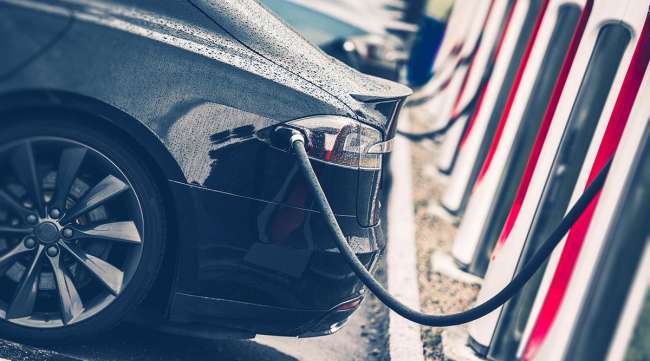The Detroit News
Here’s Why Leasing an EV Is About to Become More Popular

[Stay on top of transportation news: Get TTNews in your inbox.]
WASHINGTON — Electric vehicle leases are likely to surge beginning April 18, experts say, as new federal restrictions on EV tax credits come into effect.
The Inflation Reduction Act included newly written tax credits that offer up to $7,500 off new electric vehicles, as long as a big portion of the critical minerals and battery components come from the United States or key allies. They also need to be built in North America and retail under certain price points.
Without the mineral and battery component rules, only 39 models qualify — less than half of all EVs available in the United States — according to the Alliance for Automotive Innovation. Come April 18, that list is expected to narrow significantly.
However, the IRA also approved a $7,500 tax credit for commercial electric vehicles that don’t include any of those requirements. And in late December, the U.S. Treasury indicated vehicles leased by consumers would qualify for the more permissive commercial credit.

Manchin
It delighted automakers like Hyundai Motor and Kia Corp., which to date have sold EVs assembled outside North America, and allies like South Korea and the European Union. It incensed Sen. Joe Manchin (D-W.Va.), who has argued it is a loophole out of line with the intention of the law he wrote.
Automakers and industry advocates argued it could be used to reduce the price of leases for consumers, though it is the lenders — banks or automakers’ own lending subsidiaries known as captive finance companies — that will receive the credit.
“If the universe of vehicles eligible for (the purchase credit) moves from the 43% eligible down to lower percentages such as 10 to 15%, we may see (leasing) as more of an attractive way to help get EVs into the market,” said Andy Koblenz, executive vice president for legal and regulatory affairs at the National Automobile Dealers Association.
“And we’re actually seeing it in the marketplace,” he added, speaking April 6 at an event hosted by the Federal Reserve Bank of Chicago. “A number of lenders ... have offered lease incentive programs. Everyone I have seen has offered it at the full amount.”

Drury
Data also indicates automakers already are taking advantage of the so-called loophole: Leases made up 10% of all dealer transactions involving electric vehicles in December, before the law went into effect, according to Ivan Drury, Director of Insights at Edmunds. That number rose to 16% in January, 25% in February and 34% in March.
The only thing that had changed in the market was the Treasury Department’s late December guidance indicating leased vehicles could qualify for the discounts intended for commercial fleets, he said. “Automakers had seen the loophole and started to utilize it” as soon as they could.
“It’s helping us sell cars, no question,” said John Luciano, the owner of Street Volkswagen in Amarillo, Texas. The $7,500 going to Volkswagen Financial Services for each ID.4 comes “straight off the top; your payment drops considerably. Most people love it.”
He has found some interest in EVs even in Amarillo, which he called “the oil and gas capital of the world.” But if the ID.4 isn’t eligible for the sales tax credit after April 18, he said, “sales will stop. They won’t fall off — they’ll stop.”
Leases are “really going to be the only way you can market it to be competitive,” Luciano added. “You almost have to lease it.”
Who Benefits?
Most leased vehicles are financed by an automaker’s captive finance company, which acts like an internal bank lending dealers the money to buy the vehicles from the automaker. That means those internal banks will get the tax credit for commercial EVs.
How they choose to spend that money is up to them — there is nothing in the law that requires the lending institutions to pass the savings on to dealers or their customers.
Here's why leasing an electric vehicle is about to become a lot more popular https://t.co/BrNAK6NQaL — The Detroit News (@detroitnews) April 7, 2023
“So it really comes down to profit motive: How motivated the automaker and their dealer networks are to get that vehicle off the lot,” said Chris Harto, a senior policy analyst at Consumer Reports. He said he has already reviewed lease deals that clearly include the credit and others that indicate it wasn’t passed to consumers.
“If vehicles are flying off the lot without them passing it along, then there’s an incentive for them to just pocket it,” Harto said.
There are still more people who want to buy an EV than can find one. Demand for EVs increased 350% from 2020 to 2022, according to an analysis released last week by Consumer Reports, and there are around 45 EV-ready buyers for every new EV being manufactured.
That demand may remain high, according to the report’s findings. Nearly one-third of drivers in the market to buy or lease a new vehicle weren’t even considering a gas-powered one.
But electric vehicle prices are dropping from their pandemic price surge and may reach cost parity with gas-powered cars sooner than many expected. Dealers and automakers argue competition is a powerful incentive that will ensure customers benefit from the credit for leased vehicles.

Ricart
“The beauty of the automobile franchise system is that there is competition. I have dealers in my market that probably have that same vehicle, and I’m gonna have to give them a competitive price,” said Rhett Ricart, owner of Ricart Automotive in Columbus, Ohio, and a member of the NADA Board.
When customers compare the price of leasing a vehicle from a dealer that doesn’t offer the incentive with another that does, they’ll beeline for the one with the discount, he said: “Where you got an issue with it is with Lucid, Tesla and all the rest of the direct manufacturers. Whether they share it or not, who knows?”
Manchin’s Frustration
Manchin remains frustrated with the way the Biden administration has implemented the electric vehicle tax credits. His office said in January that it was looking for ways to clarify the intent of the commercial tax credit, and last week he said he might sue over Treasury’s proposed guidance.
“If it goes off the rails” and violates the intent of the Inflation Reduction Act, he said, “I will do whatever I can. If that means going to court, and I can do it, I’d do it.”
He said he’s most concerned that the rules won’t adequately push supply chains into the United States. In a statement in response to Treasury’s new guidelines released last week, he said, “American tax dollars should not be used to support manufacturing jobs overseas.”
Today, we are proud to welcome our new Executive Director, Albert Gore, who joins ZETA ⚡️ following 7 yrs at @Tesla, most recently as the Lead for Public Policy and Business Development in the Eastern and Midwestern United States.
Welcome aboard! https://t.co/MVQMFZ7S6k pic.twitter.com/nGDbnhEZmU — Zero Emission Transportation Association (@zeta_2030) January 4, 2023
Albert Gore, executive director of the Zero Emission Transportation Association and son of former Vice President Al Gore, said “there isn’t really another conclusion” for Treasury to have made on the eligibility of leased vehicles given the way the law is written, but that “it’s going to have the intended effect” of getting more EVs on the road.
“If automakers are looking to get electric vehicles on the road at scale, they’re really looking to create supply chains or scale up their existing supply chains in a way that complies with the guidance for new vehicle sales,” Gore said. “And that’s a great thing.”
Want more news? Listen to today's daily briefing below or go here for more info:
Distributed by Tribune Content Agency, LLC




